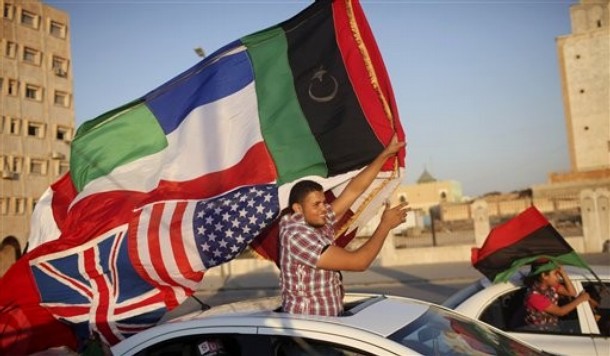
From Ivo H. Daalder and James G. Stavridis, the International Herald Tribune: Monday, Oct. 31st, seven months after it started, NATO’s operation in Libya will come to an end. It is the first time NATO has ended an operation it started. And it comes on the heels of an historic victory for the people of Libya who, with NATO’s help, transformed their country from an international pariah into a nation with the potential to become a productive partner with the West. . . .
This was a true alliance effort. The United States played a leading role, first by taking out Libya’s integrated air defense system, then by providing the critical enablers that allowed other NATO countries and partners to shoulder their significant share of the burden. Meanwhile the U.S. provided the vast majority of the intelligence, surveillance, and reconnaissance assets to monitor Qaddafi’s forces and equipment threatening civilians, the targeters that turned this information into targets for NATO forces to strike, and the aerial refueling that enabled our partners to stay up long enough to locate and destroy those targets.
The crucial and irreplaceable U.S. contribution to the overall effort was to enable other allies and partners to fully participate in the operation. In all, 14 NATO members and 4 partner countries provided naval and air forces for NATO’s three missions.
Together, these 18 countries bore the heaviest brunt of the alliance effort. While U.S. planes flew a quarter of all sorties over Libya, France and Britain flew one third of all missions — most of them strikes — and the remaining participants flew roughly 40 percent. The non-U.S. NATO and coalition partners flew 75 percent of the sorties overall. . . .
Every operation offers lessons to be learned. The Libya operation exposed some shortfalls in allied capabilities, and highlighted the importance of allied commitments to addressing these shortfalls. It also made clear the need for like-minded partners around the world. Moreover, the operation’s success rested on a set of unique circumstances. A brutal dictator who had decided to inflict murder and mayhem rather than step aside provided a demonstrable need for outside intervention. Strong regional support, from the opposition and the Arab League, ensured that any intervention would be welcomed. And the U.N. mandate provided a sound legal basis for action.
Demonstrable need. Regional support. A sound legal basis. These are what made intervention necessary. NATO is what made successful intervention possible.
Ivo H. Daalder is the U.S. permanent representative to NATO. Adm. James G. Stavridis is supreme allied commander, Europe, and commander of the United States European Command. (photo: AP)
Image: ap%208%2024%2011%20Libya%20flags.jpg
